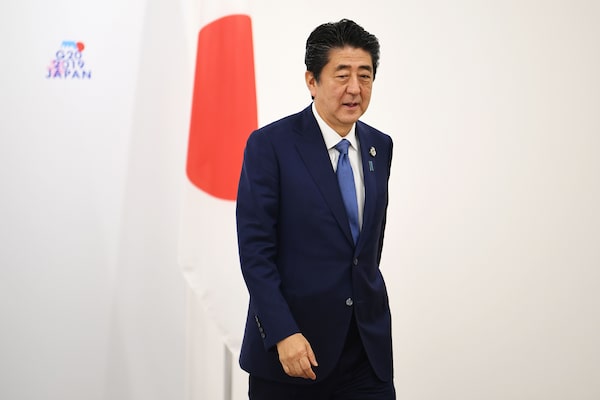
Then-Japanese prime minister Shinzo Abe at a bilateral meeting with South African President Cyril Ramaphosa (not pictured) at the G20 Osaka Summit in Osaka on June 28, 2019.CHARLY TRIBALLEAU/AFP/Getty Images
In the hours after Shinzo Abe’s assassination, Joe Biden lauded the former Japanese prime minister as a bulwark of democracy. The U.S. President ordered flags at government buildings flown at half-staff until Sunday, then went to the Japanese ambassador’s residence in Washington to sign a condolences book.
“I am stunned, outraged, and deeply saddened by the news that my friend Abe Shinzo, former Prime Minister of Japan, was shot and killed while campaigning,” Mr. Biden said in a statement Friday. “The longest serving Japanese Prime Minister, his vision of a free and open Indo-Pacific will endure.”
During his time in office, which ended in 2020, Mr. Abe drew plaudits from Japan’s allies for trying to contain the rising economic power of authoritarian China, including by forging the Comprehensive and Progressive Agreement for Trans-Pacific Partnership. The 2018 deal created a free-trade zone that includes Canada and other countries in the Americas, East Asia and Oceania.
Mr. Biden recalled visiting Mr. Abe in Tokyo and hosting him in Washington while the pact was being negotiated during Mr. Biden’s vice-presidency.
Trudeau says assassination of Japan’s Shinzo Abe ‘horrifically disturbing’
Shinzo Abe was a strong defender of Japan on the world stage
Prime Minister Justin Trudeau, who helped Mr. Abe salvage the Trans-Pacific Partnership in 2018 after then-U.S. president Donald Trump pulled his country out of the deal, highlighted the shocking context of the former prime minister’s slaying. Mr. Abe was stumping for a candidate in upper house elections outside a Nara railway station, in one of the world’s safest countries, when he was shot from behind with what appeared to be a homemade shotgun.
“He was a dedicated, visionary leader and a close friend of Canada,” Mr. Trudeau said in a statement. “This act of senseless violence during an election period is deeply disturbing. We will always stand against any form of violence, threats, and intimidation that undermine our democracies.”
Candice Bergen, interim leader of the Conservative Party, described Mr. Abe’s legacy as “one of a commitment to regional prosperity and security.”
After Mr. Abe visited Ottawa in 2019, a Canadian-purchased souvenir went viral on Instagram. In a video, Mr. Abe and his wife, Akie, were shown nailing the item, a wooden door-knocker shaped like a beaver, to the front of their villa outside Tokyo.
Taiwanese President Tsai Ing-wen, whom Mr. Abe backed during a trade dispute last year with China, said Friday that Mr. Abe had been “an important and close friend” to Taiwan. “Taiwan and Japan are both democratic countries with the rule of law, and our government severely condemns violent and illegal acts,” she said.
Olaf Scholz, the Chancellor of Germany, vowed to “stand closely by Japan’s side” following the killing. French President Emmanuel Macron said Mr. Abe had “dedicated his life to his country and worked to ensure order in the world.” In a tweet, British Prime Minister Boris Johnson praised Mr. Abe’s “global leadership” and said he “will be remembered by many.”
Mr. Abe had a more fraught relationship with Japan’s neighbours because of his brand of nationalism. Among other things, Mr. Abe played down and denied human-rights atrocities committed by Japanese forces during the Second World War; visited Tokyo’s Yasukuni Shrine, which honours convicted war criminals; and supported amending Japan’s pacifist constitution to increase the role of its military.
South Korean President Yoon Suk-yeol offered condolences to the Japanese people, “who have lost the longest-serving prime minister and respected politician in Japan’s constitutional history.”
China’s embassy in Tokyo issued a statement saying Mr. Abe had “made contributions towards improving China-Japan relations during his term” and said Beijing sends “sympathies to his family.”
Mr. Trump had an uneven rapport with Mr. Abe. The ex-president campaigned against the TPP and criticized Japan’s trade practices before seeming to warm to his Japanese counterpart over games of golf. The pair shared some ideological similarities, with Mr. Abe famously refusing to take in Syrian asylum seekers at the height of that country’s refugee crisis in 2015.
“Few people know what a great man and leader Shinzo Abe was, but history will teach them and be kind,” Mr. Trump wrote on his social-media network, Truth Social, on Friday.
Mr. Biden, meanwhile, pointed out that Mr. Abe’s assassination was all the more surprising because of how rare such violence is in Japan. The country logged just one gun-related murder last year, compared with more than 20,000 in the U.S.
“While there are many details that we do not yet know, we know that violent attacks are never acceptable and that gun violence always leaves a deep scar on the communities that are affected by it,” he said.
With a report from Reuters
Our Morning Update and Evening Update newsletters are written by Globe editors, giving you a concise summary of the day’s most important headlines. Sign up today.
 Adrian Morrow
Adrian Morrow